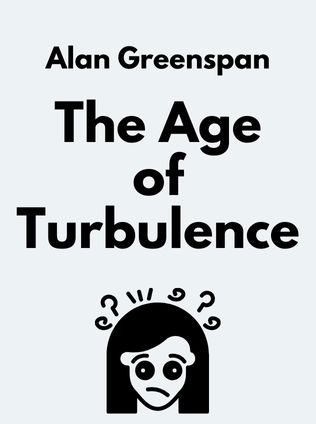
The Age of Turbulence
Adventures in a New World
By Alan Greenspan
Published 09/2007
About the Author
Alan Greenspan earned a Ph.D. in economics from New York University. In 1954, he co-founded Townsend-Greenspan & Co., an economic consulting firm. He served as chair of the Council of Economic Advisors under President Gerald Ford from 1974 to 1977. In 1987, he was appointed chairman of the Federal Reserve Board by President Ronald Reagan. Greenspan served as chair until his retirement in 2006. His book, The Age of Turbulence: Adventures in a New World, offers an insightful look into his life, career, and the economic philosophies that have shaped modern capitalism.
Main Idea
In The Age of Turbulence, Alan Greenspan provides a comprehensive memoir that reflects on his life, his role as the Chairman of the Federal Reserve Board, and the global economic landscape. The book is divided into two parts: the first half is a personal memoir detailing his journey and experiences, while the second half is a profound analysis of the economic challenges and opportunities in the 21st century. Greenspan emphasizes the importance of free-market capitalism and discusses the need for adapting to new economic realities in a rapidly changing world.
Table of Contents
- Introduction
- Beginnings
- The Education of an Economist
- The Public Servant
- The Federal Reserve and Beyond
- Global Economic Challenges
- The Future of Capitalism
Introduction
The introduction to Greenspan's memoir recalls one specific day in his 75th year of life: September 11, 2001. On this day, he was flying back to the United States from Zurich, Switzerland, when the terrorist attacks occurred. Greenspan describes the immediate economic concerns that arose from the attacks, highlighting the uncertainty and potential crises that could unfold.
"The possible economic crises were all too evident. The worst, which I thought highly unlikely, would be a collapse of the financial system." - Alan Greenspan
This chapter sets the tone for the rest of the book, establishing the importance of economic stability and the role of the Federal Reserve in maintaining it. Greenspan then transitions to a chronological recount of his early life, offering glimpses into his childhood, education, and early career.
Beginnings
Greenspan's parents divorced before he could remember them being together as a family. He credits his mother with instilling in him a love for music, which led him to play clarinet and saxophone in jazz bands during high school. After being rejected from military service due to a potential health issue, Greenspan studied at Juilliard before joining the Henry Jerome Orchestra. Despite his passion for music, Greenspan was drawn to economics, enrolling in New York University's School of Commerce, Accounts, and Finance. He describes the post-World War II fascination with economics and his disinterest in John Maynard Keynes' theories, preferring free-market principles instead. A pivotal figure in his education was Ayn Rand, whose philosophy of Objectivism greatly influenced his economic views.
"I was known as the band's intellectual." - Alan Greenspan
Greenspan's early years reveal an interesting blend of his love for music and his growing passion for economics. He recounts how, while others partied between sets, he would read books about J.P. Morgan or work on his bandmates' tax returns. This early dedication to his intellectual pursuits set the stage for his later achievements in the field of economics.
Sign up for FREE and get access to 1,400+ books summaries.
You May Also Like
Rich Dad Poor Dad
What the Rich Teach Their Kids About Money - That the Poor and Middle Class Do Not!
By Robert T. KiyosakiFreakonomics
A Rogue Economist Explores the Hidden Side of Everything
By Steven D. Levitt and Stephen J. DubnerI Am Malala
The Story of the Girl Who Stood Up for Education and Was Shot by the Taliban
By Malala Yousafzai



















